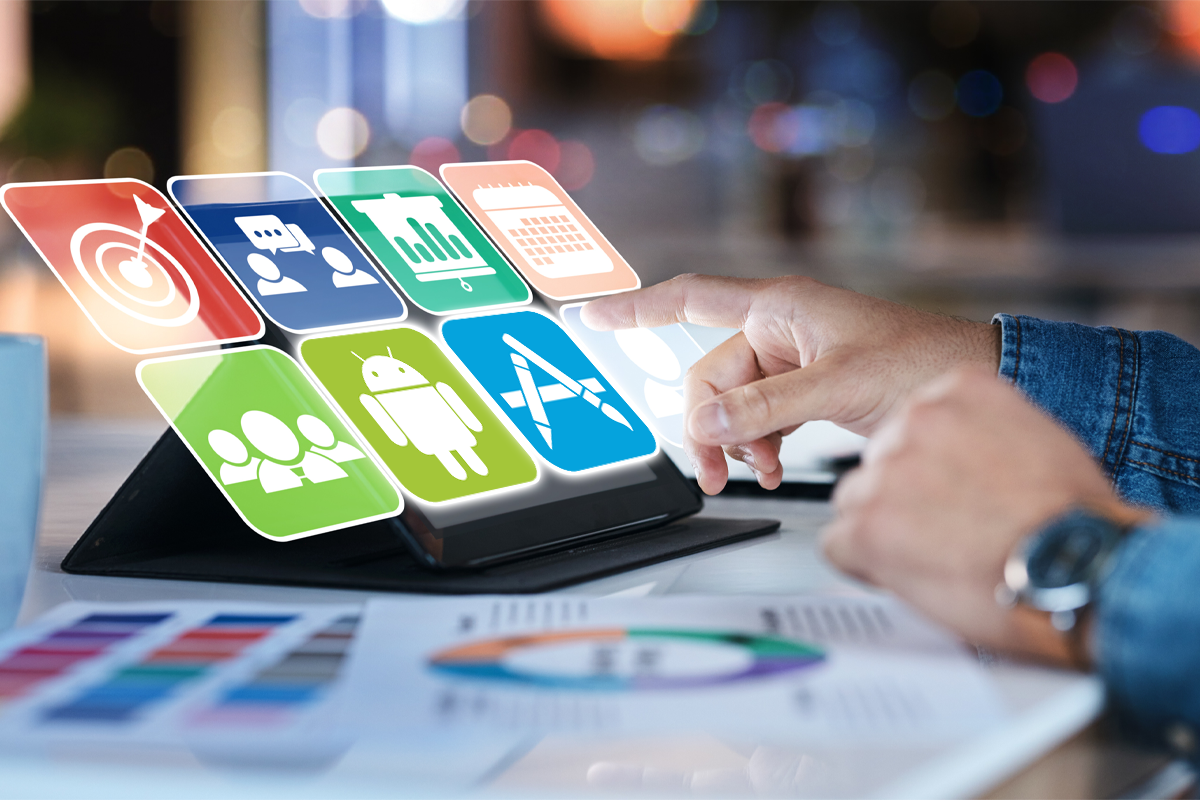Mobile and mobile applications have become essential tools for businesses and individuals alike. In this modern scenario, the two dominant operating systems, iOS and Android, offer a vast user base and unique development environments. Choosing the right platform for your app development can significantly impact its success.
In this blog, we’ll understand the key factors to consider when deciding iOS vs. Android app development.
What is iOS?
iOS, formerly iPhone OS, is Apple’s mobile operating system. It has been solely designed to power various Apple devices, including iPhones, iPads, and iPod Touch devices. It is focused on providing a smooth and intuitive user experience. iOS also enables a platform for developers to create a wide range of applications (apps) for Apple’s devices. Its main features include a user-friendly interface, high security, performance, updates, Siri, iCloud, multitasking, and many more.
iOS is known for its stability, security, and consistent user experience across Apple devices. It has a large and dedicated developer community that creates a wide range of apps to cater to various needs and preferences.
Note: The last update on full-point release was iOS 16.5, which was released on May 20, 2023.
What is an Android App?
An Android app refers to a software application specifically designed and developed to run on devices that utilize the Android operating system. It is an open-source mobile operating system created by Google, and it powers a wide range of devices. It includes smartphones, tablets, smart TVs, smartwatches, and more. These apps are available on the Google Play Store for compatible devices. They offer customizability, integration with Google services, and app intents. They are also open source.
Android app development involves using programming languages such as Java or Kotlin and utilizing development tools like Android Studio. Developers can create apps for a wide range of purposes, from entertainment and communication to business and education. The availability of Android apps on a multitude of devices makes them a crucial part of the modern digital landscape.
Note: The latest iteration of Android is Android 13, which Google unveiled on August 15, 2022.
Understanding the Differences
- User Demographics and Market Share:
App development has become a crucial factor for almost every business. So, before starting your app development journey, it’s important to understand the user demographics and market share of each platform. You need to provide the exact requirements to the application service provider are the two major factors you need to consider.
iOS devices like iPads and iPhones are popular among affluent audiences in regions like North America and Europe. This makes it popular among a certain group of people who have the ability to afford these devices.
Android devices have a broader global reach, with a significant market share in emerging markets. This constraint makes it popular and easier to use for the population.
- Design and User Experience:
Design and user experience are the high-level factors considered and tested to create a friendly and meaningful. In the vicinity of mobile apps, iOS and Android have distinct design philosophies.
iOS is known for its sleek and minimalist design to attract its customers. It focuses on providing a consistent and polished user experience.
Android offers more flexibility in design, allowing developers to tailor their apps to different devices and screen sizes. Consider your app’s design preferences and target audience when choosing a platform.
Development Environment
- Programming Languages:
iOS app development primarily utilizes Swift and Objective-C programming languages. Swift is known for its speed and safety features, making it a favorite among developers.
Android app development mainly relies on Java and Kotlin. Kotlin is a newer language that offers concise and expressive syntax, enhancing developer productivity.
- Development Tools and IDEs:
Apple’s Xcode is the integrated development environment (IDE) for iOS app development, offering a comprehensive suite of tools for designing, coding, testing, and debugging.
Android Studio serves as the primary IDE for Android development, providing a robust environment equipped with advanced features for efficient coding.
Distribution and Monetization
- App Store vs. Google Play Store:
The review and approval processes for the Google Play Store & App Store differ from each other.
Apple’s App Store is known for its precise review guidelines, ensuring high-quality apps but potentially causing longer approval times. This takes time and enables customers to wait for a longer time period.
Google Play Store follows a more open approach, allowing faster deployment but necessitating vigilant quality control. It processes the apps comparably faster than Apple’s App Store.
- Monetization Models:
Monetization strategies can also influence your platform choice. iOS users spend much on in-app purchases and premium apps, making the application development company a profitable platform. It makes sure to be the best platform for generating revenue.
Android users, while more numerous, are generally more accustomed to free apps with in-app advertisements. Here, users can download their desired apps without paying additional costs. However, there are certain apps which may demand payment option to use.
Consider Your Project Goals
- App Complexity and Features:
Prepare a list of requirements for your app needs. Analyze and strategize the complexity of your app and the desired features. These factors can vastly impact your platform decision and give an output of which operating system to consider. This will also decide the budget of your app development by the application development company.
If your app requires advanced graphics, consider iOS for its uniform hardware and performance optimization.
Android’s flexibility is advantageous for apps that demand varied functionalities across different devices.
- Time to Market
iOS typically boasts a shorter development cycle due to its controlled ecosystem and device fragmentation. If you’re looking to launch your app quickly, iOS might be the better choice. Android development, while slightly more time-consuming, can offer a broader reach.
Key Characteristics of iOS Include
User Interface: iOS is known for its sleek and user-friendly interface. It features a grid of icons for accessing apps, a control center for quick settings access, and notifications that display information and updates.
App Store: The App Store is a main marketplace where users download and install a vast array of applications, including games, productivity tools, social media apps, and more.
Security: iOS places a strong emphasis on security. It incorporates features like Face ID (facial recognition) and Touch ID (fingerprint recognition) for device unlocking and authentication. Apps also run in a sandboxed environment, enhancing security by restricting their access to certain device resources.
Performance: Apple optimizes iOS to work seamlessly with the hardware in their devices, resulting in smooth performance and efficient use of resources.
Updates: Apple regularly releases updates to iOS to introduce new features, improvements, and security patches. Users are encouraged to keep their devices updated to benefit from the latest enhancements.
Siri: Siri is Apple’s virtual assistant, offering voice-activated commands and responses to various queries and tasks.
iCloud: iCloud is Apple’s cloud-based service that allows users to store data, like documents, app data, and photos, across their devices and access it from anywhere.
Multitasking: iOS offers multitasking capabilities that allow users to switch between apps seamlessly and use multiple apps simultaneously.
Key Characteristics of Android Apps Include
Diverse Devices: Android apps are compatible with a variety of devices from different manufacturers, which contributes to the platform’s wide user base and device ecosystem.
Google Play Store: This is the primary marketplace for Android apps. It offers a vast collection of apps, ranging from games and productivity tools to social media and entertainment apps.
Open Source: Android is open source, meaning that its source code is available for anyone to view, modify, and distribute. This has contributed to its popularity and the development of a large developer community.
Integration with Google Services: Android apps can integrate seamlessly with various Google services, such as Gmail, Google Drive, Google Maps, and Google Calendar.
Notifications: Android’s notification system is designed to keep users informed about updates, messages, and other important events. Notifications can be expanded, dismissed, or acted upon directly from the notification shade.
App Intents: Android apps can interact with each other through a feature called “intents.” This allows apps to launch other apps’ activities for specific tasks, enhancing interoperability.
Regular Updates: Google releases new versions of the Android operating system periodically, each accompanied by new features, improvements, and security updates.
So, do you have any idea which operating system to choose for your app? Well, the Android vs iOS platform is only meant to deliver you the main factors that you need to consider before starting your app. While iOS has a wider audience, Android excels in the customization part. You must organize your requirements to be suitable for the business and customers. Develop a mobile application by strategizing every aspect of your business. Good luck with your app development!
Frequently Asked Questions
1. What are the primary programming languages and development tools for Android and iOS app development?
iOS app development primarily utilizes Swift and Objective-C programming languages. Android app development mainly relies on Java and Kotlin.
2. How do monetization models differ between iOS and Android?
iOS users make more in-app purchases and premium apps, making it a profitable platform for generating revenue. Android users, while more numerous, are generally more accustomed to free apps with in-app advertisements.
3. How should app complexity and desired features guide platform selection?
Analyze and strategize the complexity of your app and the desired features. This will give you an idea of adapting the right application setup to develop your app.
4. How does time to market differ between iOS and Android app development?
iOS typically boasts a shorter development cycle due to its controlled ecosystem and device fragmentation. If you’re looking to launch your app quickly, iOS might be the better choice. Android development, while slightly more time-consuming, can offer a broader reach.










